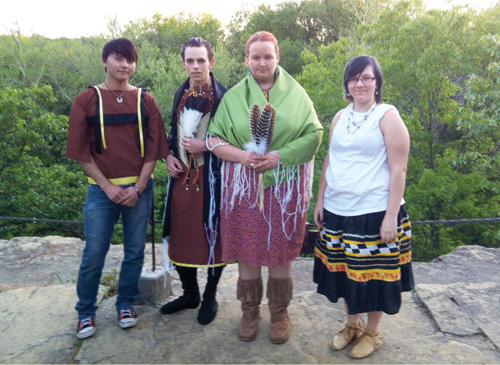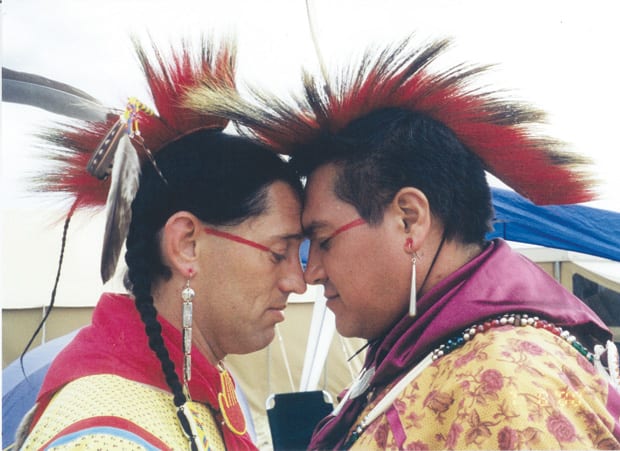Newly formed Texas Two Spirit Society helps LGBT American Indians rediscover heritage, quickly grows to more than 150 members

POWWOW PRAYER PARTNERS Two spirit couple Joey Criddle and Tony Staton face each other in prayer during a powwow in New Mexico circa 2000. (Courtesy of Crisosto Apache)
Kirby Peterson grew up in a small town on a Navajo reservation in New Mexico in a culture he described as unaccepting.
While some American Indian tribes are reverent of their gay and lesbian members, Peterson described his school years more like those of many LGBT teens around the country.
“Life was very hard on the reservation,” he said. “I was abused, called names and bullied.”
He said he was not accepted by his parents and thrown out of his house.
“My parents told me I was on my own at 18,” he said.
Since he’s come out, he said he’s hardly spoken to his family.
After moving to Dallas, Peterson met Barry Layton, and together they attended the National Confederation of Two Spirit Organizations gathering in Tulsa in 2012.
Peterson and Layton identify as “two spirit,” an Indian term to describe those who have both the spirit of a man and the spirit of a woman. In many tribes, the term encompasses those who are gay, lesbian or bisexual, as well as those who are transgender.
But rather than focus on sexuality, Indians focus on spirituality. Since two spirit people were considered doubly blessed, they were often the shamans, teachers and spiritual leaders.
Although two spirit is a contemporary term, at least 155 of the indigenous nations have documented multi-gender traditions.
After Peterson and Layton attended the conference in 2012, Layton decided Texas needed to be part of the movement. He formed the Dallas
Two Spirit Society, and less than a year later, it has more than 50 members and meets monthly at Resource Center Dallas.
Panhandle and South Texas chapters have organized with several others in the works bringing statewide membership to more than 150.
Crisosto Apache, executive director of the Colorado-based Two Spirit National Cultural Exchange, said there are roughly 18 two spirit organizations and social groups nationwide, including the one in Texas.
“There’s a lot of these organizations that are popping up,” he said. “I think it’s pretty amazing that that’s happening, and I think all these organizations have the same goal in mind.”
Apache is an enrolled member of the Mescalero Apache Tribe in New Mexico, but he lives in Denver.

BANDING TOGETHER | Kirby Peterson, from left, Barry Layton and Carrie Dixon lead the Dallas group, which meets monthly at Resource Center Dallas.
“A lot of people are leaving reservations to define their own sexuality in urban areas,” he said. “They’re leaving reservations to go to urban areas to sort of immerse themselves in the GLBT community.”
Tracing their affirming ancestries
Layton, who is mostly Cherokee with some Chickasaw and Choctaw, grew up in Sulphur Springs and “assimilated like most Native Americans,” he said.
When Layton came out to his sister, she suggested they look into how American Indians view LGBT issues.
“She wanted to raise me in a traditional way,” he said.
Layton’s sister, Angela, works with the Dallas Two Spirit Society helping members trace their genealogy.
As Layton began exploring his roots, he decided to immerse himself in Cherokee culture, because that part of his heritage felt right to him.
His mentor is a two spirit tribal elder who lives in Alabama.
“When I speak Cherokee, it forces me to speak with more meaning and speak clearer,” he said. “Texas has lost its culture. People are starving for it. Without it, you lose your purpose.”
Layton said it’s hard for people to trace their ancestry in Texas. After passage of the Indian Removal Act of 1830, tribes from the Southeast were forcibly relocated to Oklahoma in 1831. Thousands died from starvation, disease and harsh conditions.
“Texas was one of the top places people ran away to from the Trail of Tears,” he said.
Although many tribes have traditions of accepting two spirits, Layton said many people in the group grew up in families where they couldn’t be gay and couldn’t be out as Native Americans. The Dallas group is a place of community where many can be out for the first time.
Layton has also become an LGBT activist, participating in local marriage rallies and addressing the City Council as a representative of the Two Spirit Society last month.
Carrie Dixon, vice president of the Dallas group, said she and Layton have been friends since they were “kids on the playground.”
She grew up assimilated in a home where her grandparents never discussed being Native American. That’s because of a fear the government would take the children to place in boarding school “to each them who they’re not,” she said. That happened to her grandparents.
So she came to the Dallas Two Spirit Society with little knowledge of her Creek background.
“The gay tradition is very sacred to us,” she said.
Her tribe recognizes four genders. Two spirit people are the shamans and the ones the chiefs go to for counsel.
“Creeks are required to have a child,” she said, no matter the orientation.
And Dixon, who is bisexual, is pregnant with her first child. She said she’ll raise her differently than she was raised.
“I’ll steep her in tradition,” she said.
And part of that tradition is honoring two spirit people.
Christianity corrupts tribal customs
Some tribes have begun adopting laws that officially recognize their two spirit members.
The Coquille Tribe in Oregon was the first to adopt a marriage equality law in 2008. The Suquamish Tribe in Washington legalized same-sex marriage in 2011 before Washington state followed a year later.
Two Michigan tribes, the Little Traverse Bay Bands of Odawa Indians and Pokagon Band of Potawatomi Indians, and the Santa Ysabel Tribe in California legalized same-sex marriage this year. The Pokagons issued their first marriage license to a gay couple on June 20, less than a week before the Supreme Court ruled on the Defense of Marriage Act.
The Cherokee are accepting of two spirit people and honor them as shamans, but in 2004, the tribe adopted a constitutional amendment defining marriage as between one man and one woman. Angela Layton blamed that on the effect of assimilation.
Most tribes across the country have neither outlawed nor allowed same-sex marriage, but tribes in Oklahoma have been particularly resistant to the idea of marriage equality. The Iowa Tribe of Oklahoma and Muskogee Creek Nation outlawed same-sex marriage in 2004. “No Marriage will be recognized between persons of the same sex” according to the laws of the Chickasaw Nation.
The Navajo reservation, the largest reservation in the U.S. covering large portions of New Mexico, Arizona, Colorado and Utah, recognized same-sex couples historically. But in 2005, an amendment banning same-sex marriage passed.
The president of the Navajo Nation vetoed the measure, but the Navajo Nation Council overrode him.
Apache blamed opposition to marriage equality within tribal communities on religious acculturation, which has led many natives on reservations to become evangelical Christians.
It’s unclear how the U.S. Supreme Court’s decision to strike down a section of the federal Defense of Marriage Act will affect same-sex couples in tribal communities.
The National Confederacy of Two-Spirit Organizations issued a press release the day after the DOMA decision celebrating the victory. But a spokesperson for the organization indicated that any changes in recognition would come at a tribal level.
“It’s a good day to celebrate the decision to overturn DOMA and the dismissal of Prop 8,” said Sharon Day of Minneapolis’ Indigenous
People’s Task Force. “Perhaps now more of our tribal governments will pass marriage equality laws, after all respect was a value shared by all tribes/nations observed along with equality between all people including our two spirit people.”
Finding, making peace in Dallas
Despite his negative experience on the reservation, Peterson has also come to embrace American Indian history.
He spoke Navajo and English at home before moving to Dallas, but he called his native language hard. (Navajo is so difficult, the U.S. government used it as code in the Pacific campaign during World War II and the Japanese never cracked it.)
Peterson has picked up a few other languages, including Chinese, and is working on Japanese. At the 2012 conference, he began learning about differences in tribal cultures.
“Spiders and snakes are lucky and safe in Cherokee,” he said. “For me, it’s more bald eagles and golden eagles.”
He said another tradition is if a fox or coyote walks in front of you, you’re going in the wrong direction.
Today, Peterson has a partner of more than a year and is in a management-training program at work. In his apartment, he displays Navajo art. One ceramic shows a Navajo man doing a ceremonial dance in traditional costume. Another is an ornamental piece crocheted by his grandmother in traditional Navajo colors.
Lydia Nibley, who produced the film Two Spirit that aired on PBS, said Peterson’s experience does not reflect longstanding Navajo culture.
Like Angela, she blamed intermingling Christianity, assimilation and schools run by the U.S. government for the loss of honoring the two spirit tradition.
“Many tribal cultures have become very distant from their teachings,” she said. “There’s an honored place for third and fourth gendered people in Navajo tradition.”
She said the Navajo balanced the masculine and feminine.
“It keeps the world working properly,” she said. “The Navajo have a particularly strong tradition of honoring two spirit people.”
And like Peterson, she mentioned another of Navajo’s rich traditions.
“Touch a two spirit person on the shoulder for good luck,” she said.
This article appeared in the Dallas Voice print edition July 12, 2013.


